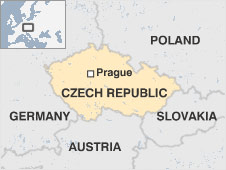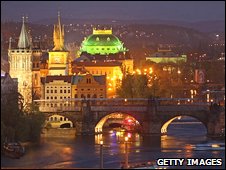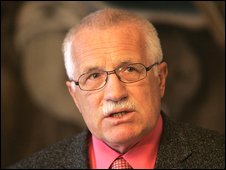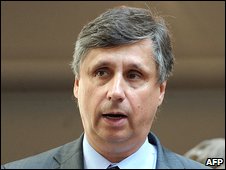 |
Part of Czechoslovakia until the "velvet divorce" in January 1993 the Czech Republic has a rich cultural heritage.
With strong traditions in folk music and theatre it has also been the
birthplace of classical composers such as Antonin Dvorak and writers such
as Franz Kafka and Jaroslav Hasek.
Overview
Today tourists flock to savour Czech architectural treasures which include some of the finest Baroque Art Nouveau and Cubist buildings on the continent. The hot springs of Karlovy Vary and other spas are an attraction to many.

Historic Prague is the focus of a tourist boom
|
The country joined the EU in May 2004 a development almost impossible to imagine just 16 years before.
Communist rule had lasted since the late 1940s. The "Prague Spring" of 1968 when leader Alexander Dubcek tried to bring in liberal reforms was crushed by Soviet tanks.
In 1989 as the curtain was coming down on communism in the Kremlin the dissident playwright Vaclav Havel spearheaded the country's velvet revolution and became the first president of post-communist Czechoslovakia.
An era ended in February 2003 when his presidency finished. It had been interrupted for only a few months at the time of the separation of the Czech Republic and Slovakia.
Mr Havel saw the ghost of former Soviet military influence exorcised in 1999 when the republic was granted full membership of Nato. He left office having led it to the threshold of the EU. His old rival and successor as president Vaclav Klaus oversaw accession to the union.
Facts
- Full name: Czech Republic
- Population: 10.4 million (UN 2009)
- Capital: Prague
- Area: 78866 sq km (30450 sq miles)
- Major language: Czech
- Major religion: Christianity
- Life expectancy: 73 years (men) 80 years (women) (UN)
- Monetary unit: 1 koruna (Kc) = 100 halers
- Main exports: Manufactured goods machinery cars and transport equipment beer
- GNI per capita: US $16600 (World Bank 2008)
- Internet domain: .cz
- International dialling code: +420
Leaders
President: Vaclav Klaus

The former PM and current president is known as a Eurosceptic
|
Vaclav Klaus of the conservative Civic Democratic Party succeeded Vaclav Havel with whom he had many clashes in previous years in the largely ceremonial role of president in February 2003.
Parliament narrowly re-elected him in February 2008.
He was the architect of Czech post-communist economic reforms serving as finance minister in the first post-communist government and prime minister between 1992 and 1997 before financial scandals contributed to the fall of his government.
Mr Klaus is a bitter opponent of closer EU integration - though he insists that his views are more "Eurorealist" than "Eurosceptic".
Prime Minister: Jan Fischer
Little-known economist Jan Fischer was named Czech interim prime minister
in April 2009 to shepherd the country through the rest of its troubled European
Union presidency and to widely anticipated early elections.

Economist Jan Fisher says he has no plans to stay on after the next election
|
Mr Fischer the non-partisan head of the Czech Statistical Office replaced outgoing premier Mirek Topolanek whose centre-right coalition cabinet was toppled in March 2009 midway through the Czech EU presidency.
"This cabinet will have to fulfil with honour all tasks stemming from the (EU) presidency. It will also have to minimise the impact of the economic crisis on Czech population" Mr Fischer said after his appointment.
He was given a mandate to lead the government until October with the main parties agreeing to hold early elections before then. Mr Fischer also said he had no further political ambitions and that he would return to his job at the statistics office once the mission is over.
However at a vote in September 2009 to dissolve parliament and hold a snap poll in November the centre-left Social Democrats made a sudden U-turn and voted against the plans saying they could be unconstitutional.
The about-turn meant Czechs would have to wait until regular elections in June 2010 for a chance to vote in a stable government.
The decision to appoint Fischer follows weeks of talks between the three centre-right governing coalition parties and the senior opposition Social Democrats whose no-confidence vote toppled Mr Topolanek's cabinet on 24 March.
Media
Private media in the Czech Republic mushroomed in the 1990s and private radio and TV stations provide stiff competition for public broadcasters.
Public broadcaster Ceska Televize (CT) operates two TV networks and a 24-hour news channel. Public radio Cesky Rozhlas (CRo) operates three national networks as well as local services.
Two major private TV channels broadcast nationally and there are scores of private radio stations. BBC World Service is available on FM in many cities and towns.
The country is pressing ahead with the digitisation of TV broadcasting; there are plans to switch off analogue signals by 2012.
Press freedom is protected by a charter of basic rights. However Czech and foreign media organizations criticized an amendment to the penal code in 2009 that made it an offence for journalists to make public the contents of police wiretaps.
Around 5 million Czechs were online by December 2008 (Internetworldstats).
The press
- Lidove Noviny - Prague-based national daily former dissident publication
- Mlada Fronta Dnes - Prague-based national daily
- Pravo - Prague-based national daily
- Blesk - Prague-based tabloid daily
- The Prague Post - English-language
Television
- Czech TV - public operates mainstream channel CT1 and cultural channel CT2
- CT 24 - public TV news channel
- TV Nova - private
- Prima - private
Radio
- Czech Radio - public broadcaster; operates national and regional networks
- Radio Prague - Czech Radio's external service; programmes in a number of languages including English
- Frekvence 1 - private national
- Radio Impuls - private national
- Evropa 2 - private national
News agency
-
CTK - English-language pages
AFRICA | ASIA-PACIFIC | AMERICAS | EUROPE | MIDDLEEAST | SOUTHASIA
Mauritania Mauritius Morocco Mozambique Namibia Niger Nigeria Republic-of-congo Rwanda Sao-tome-and-principe Senegal Seychelles Sierra-leone Somalia South-africa Sudan Swaziland Tanzania The-gambia Togo Tunisia Uganda zambia Zimbabwe Australia Brunei Burma Cambodia China East-timor Fiji Indonesia Japan Kazakhstan Kiribati Kyrgyzstan Laos Malaysia Marshall-islands Micronesia Mongolia Nauru New-zealand North-korea Palau Papua-new-guinea Samoa Singapore Solomon-islands South-korea Taiwan Tajikistan Thailand The-philippines Tonga Turkmenistan Tuvalu Uzbekistan Vanuatu Vietnam Antigua-and-barbuda Argentina Bahamas Barbados Belize Bolivia Brazil Canada Chile Colombia Costa-rica Cuba Dominica Dominican-republic Ecuador El-salvador Grenada Guatemala GuyanaHaiti Honduras Jamaica Mexico Nicaragua Panama Paraguay Peru St-kitts-and-nevis St-lucia St-vincent-and-the-grenadines Suriname Trinidad-and-tobago United-states-of-america Uruguay Venezuela Albania Andorra Armenia Austria Azerbaijan Belarus Belgium Bosnia-hercegovina Bulgaria Croatia Cyprus Czech-republic Denmark Estonia Finland France Georgia Germany Greece Hungary Iceland Ireland Italy Latvia Liechtenstein Lithuania Luxembourg Macedonia Malta Moldova Monaco Montenegro Norway Poland Portugal Russia San-marino Serbia Slovakia Slovenia Spain Sweden Switzerland The-netherlands Turkey Ukraine United-kingdom Vatican Algeria Egypt Iran Iraq Israel-and-palestinian-territories Jordan Kuwait Lebanon Libya Mauritania Oman Saudi-arabia Sudan Syria Tunisia United-arab-emirates Yemen Afghanistan Bangladesh Bhutan India Nepal Pakistan Sri-Lanka The-Maldives

